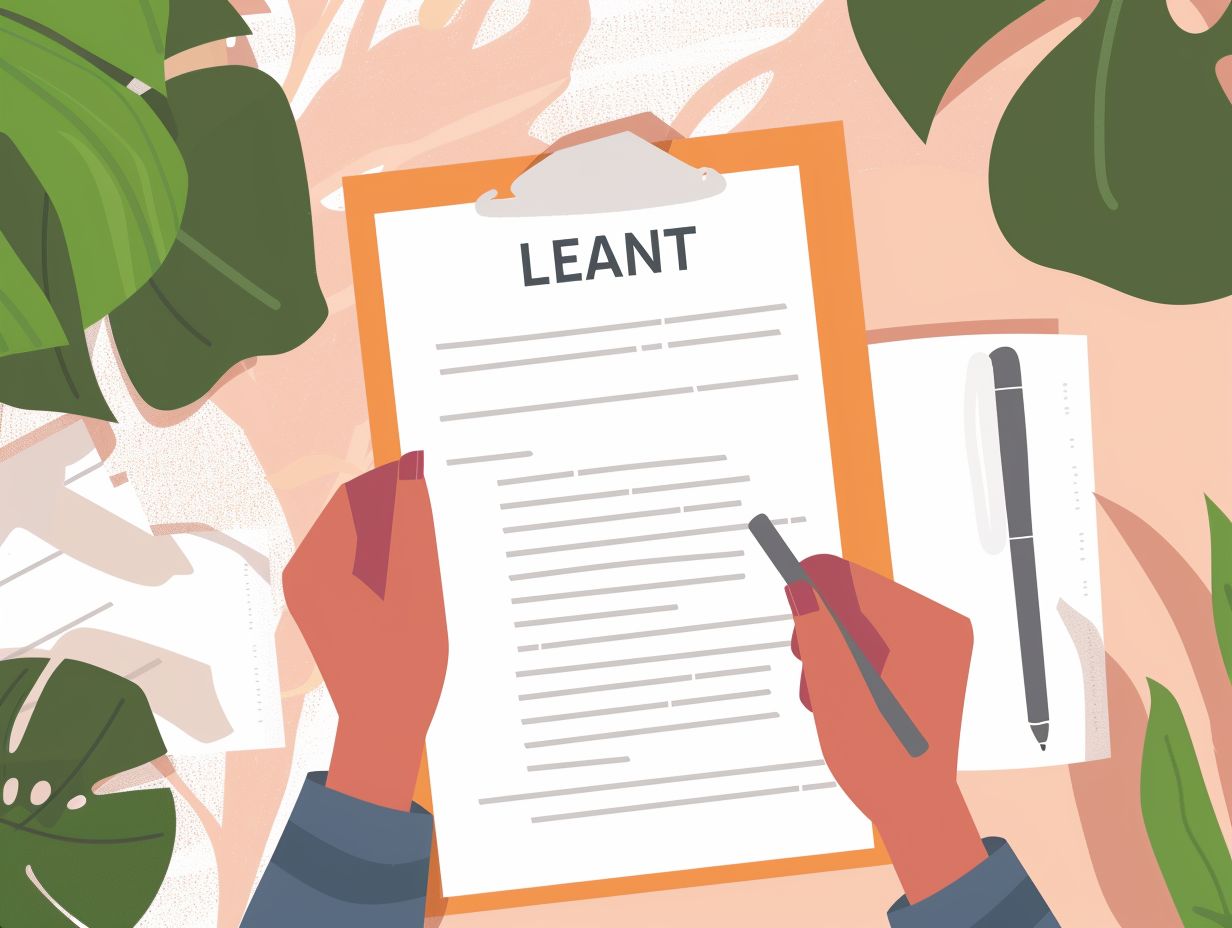If you’re an immigrant ready to rent a property in a new country, you want to be sure you understand lease agreements to make your rental experience as smooth as possible.
This guide has got your back! It’ll break down what lease agreements are all about, whether it’s for residential or commercial spaces. You’ll learn about the important elements to watch out for, how to decode all that legal talk, what specific things immigrants should keep in mind, some handy negotiation tips, and where to find extra help if you need it.
Armed with this knowledge, you can confidently step into a lease agreement as an immigrant. Stay informed, stay give the power toed!
What is a Lease Agreement?

When you sign a lease agreement, also called a rental agreement, you’re basically entering into a fancy-schmancy contract with your landlord. This contract spells out all the nitty-gritty details for renting a property, laying down the rules, duties, and rights for both you and your landlord.
Definition and Purpose
Lease agreements play a crucial role in establishing the terms of renting a property, ensuring both you and the landlord are on the same page.
In simple terms, a lease agreement is a legally binding contract that spells out the rights and duties of both parties. It covers important aspects like rent amount, lease duration, maintenance responsibilities, and other key details to safeguard the interests of both the property owner and you as the tenant.
These agreements also set the stage for resolving any disputes that might pop up during your tenancy, providing a clear process for addressing problems and promoting fairness and transparency in your rental arrangement.
Types of Lease Agreements
You’ve got your hands full with different types of lease agreements to choose from. The top dogs are residential and commercial leases, each playing its own role and following a unique set of legal rules and regulations.
Residential vs. Commercial
In the world of leases, residential agreements are for places you live in, while commercial leases are for your business digs. Each type has its own set of rules customized for its purpose.
In terms of residential leases, you’re likely to find clauses about who’s in charge of maintenance, how much the security deposit is, and rules about subletting or running short-term rentals. On the flip side, commercial lease agreements dive into stuff like what you can use the property for, where you can put up signs, and who’s on the hook for maintaining common areas.
Besides the obvious differences, legal stuff like security deposits, how long the lease lasts, and what happens if you get evicted can vary between the two types of leases. Knowing these distinctions is key for both landlords and tenants to make sure they’re following the rules laid out in their rental agreement.
Key Elements of a Lease Agreement
In a lease agreement, you’ll find important stuff like the rental terms and conditions, the rights and duties of both you as the tenant and the landlord, details about security deposits, who’s responsible for maintenance, and the rules for evictions.
Rental Terms and Conditions

In a lease agreement, you’ll find the rental terms and conditions that spell out the rules for both you and your landlord. The lease duration is usually stated in terms of months or years, with residential leases typically running from 6 months to 1 year. The rent amount is set for the entire lease period, but there might be provisions for increases under certain circumstances. You’ll have to follow a payment schedule, which could require monthly, quarterly, or annual payments, depending on what you agree on. The rental agreement may also include details about maintenance responsibilities, utility payments, and any restrictions on making changes to the property.
Responsibilities of Tenant and Landlord
As a tenant, you have certain responsibilities laid out in your lease agreement, including maintenance duties and property inspection obligations. It’s usually up to you to keep the rented property clean and tidy, with regular cleaning and proper waste disposal. Don’t forget to report any repair needs or damages promptly.
On the flip side, landlords have their own set of duties. They’re accountable for making sure the property complies with safety regulations and taking care of any necessary repairs for structural issues. Property inspections are important for both you and the landlord to evaluate the property’s condition, spot any potential problems, and make sure everyone is following the lease agreement.
Understanding Legal Jargon in a Lease Agreement
You need to grasp the legal terms in a lease agreement to make sure you understand your responsibilities and rights as either a tenant or landlord, preventing any possible disagreements.
Common Terms and Definitions
Common terms and definitions in a lease agreement include phrases like ‘lease term,’ ‘security deposit,’ and ‘eviction notice,’ each with specific legal implications and requirements.
When you’re diving into a lease agreement, you’ll come across terms like ‘lease term,’ ‘security deposit,’ and ‘eviction notice.’ Let’s break it down for you. The ‘lease term’ is all about how long you get to stay in that rental property, usually laid out in months or years in the contract.
Next up, we’ve got the ‘security deposit.’ This is the chunk of change you put down upfront to cover any potential damages or rent that goes unpaid. The landlord hangs onto it as a safety net.
And last but not least, there’s the ‘eviction notice.’ Think of it as the landlord’s official way of saying, “Time to pack up, pal.” They’ll serve you this formal written notice if you’re not paying up or breaking the lease rules, giving you a heads-up to skedaddle within a specific timeframe.
Important Considerations for Immigrants
If you’re an immigrant, you’ve got a lot on your plate when you’re looking to sign a lease. It’s crucial to get a handle on your visa and immigration status, tackle any language barriers head-on, and smoothly navigate through any cultural differences.
Visa and Immigration Status

When you’re an immigrant entering into a lease agreement, make sure to consider your visa and immigration status, as it can have a big impact on your ability to rent property legally.
If you don’t double-check that your visa status lines up with what’s needed in your lease agreement, you could run into problems like eviction or legal headaches. Before you put pen to paper on any lease, take the time to carefully go through the terms about residency status, visa validity, and any specific documents your landlord or property management might need.
It’s a good idea to get some professional advice or clear things up if you’re unsure about how your visa or immigration status might affect your tenancy rights and responsibilities.
Language and Cultural Differences
Language barriers and cultural differences can have a big impact on your understanding of lease agreements as an immigrant. It’s important for you to seek clarity and help if you need it.
Misunderstandings can pop up due to language differences, leading to confusion about terms and responsibilities in your lease. Plus, there might be some cultural subtleties that affect how you negotiate and handle leasing stuff.
To tackle these issues, it’s key for both sides to be open and patient. Giving you translated papers or bringing in interpreters can really boost communication. Having honest talks and clearing up any questions can bridge the gap caused by different cultural norms. Showing mutual respect and empathy can make the whole leasing process smoother, especially with diverse backgrounds in the mix.
Tips for Negotiating a Lease Agreement
When negotiating a lease agreement, you need to make sure you understand your rights and options. It’s important to know which lease conditions can be tweaked to better align with your needs as either a tenant or landlord.
Understanding Your Rights and Options
When negotiating a lease agreement, it’s crucial for you as a tenant or landlord to understand your rights and options. This knowledge give the power tos you to make informed decisions and secure lease provisions that work in your favor.
As a tenant, it’s important for you to know that you have the right to a habitable dwelling, privacy, and timely repairs. Being aware of your options regarding rent increases, subletting, and security deposits gives you control over your living situation.
On the flip side, as a landlord, you have rights such as collecting rent on time, maintaining the property, and evicting tenants for non-payment. In terms of lease agreements, there are negotiable provisions that may include clauses on maintenance responsibilities, pet policies, and sublease permissions. These allow both parties to customize the agreement to meet their specific needs.
Resources for Assistance with Lease Agreements
You have plenty of resources and services at your disposal to help you with lease agreements, especially if you’re an immigrant who might need some extra help sorting through the legal stuff and figuring out your rights.
Organizations and Services for Immigrants

Various organizations and services are out there ready to give specialized help to immigrants like you. They’re all about helping you figure out lease agreements and getting you the legal support you need to make sure everything’s above board and fair.
These groups are on a mission to make sure newcomers like you know exactly what you’re getting into when you sign a lease. Take, for instance, a standout organization that guides immigrants through all the legal mumbo jumbo you might find in rental contracts, so you can make smart choices. By pointing out potential pitfalls and making sure every detail is crystal clear, these services are your go-to for making sure your rights are protected when you’re leasing.
Frequently Asked Questions
What is a lease agreement?
A lease agreement is a legally binding contract between a landlord and a tenant that outlines the terms and conditions of a rental property. It specifies the responsibilities and rights of both parties, such as monthly rent, length of tenancy, and maintenance obligations.
Do I need to sign a lease agreement as an immigrant?
Yes, as an immigrant, you are still required to sign a lease agreement like any other tenant. It is a standard practice in the rental industry to protect both the landlord and the tenant.
What should I look for in a lease agreement?
When reviewing a lease agreement, make sure to look for the rental amount, security deposit, lease term, and other fees or clauses that may affect your tenancy. It is crucial to understand all the terms before signing the agreement.
Can I negotiate the terms of a lease agreement as an immigrant?
As a tenant, you can negotiate some terms of the lease agreement with your landlord, such as the rental amount or lease term. However, it is best to consult a lawyer or a trusted advisor to ensure that any changes are legally binding and in your best interest.
What happens if I break a lease agreement?
If you break a lease agreement, you may be responsible for paying any penalties or fees outlined in the contract. It is essential to understand the consequences of breaking a lease before signing it and to communicate any concerns with your landlord beforehand.
What are my rights as a tenant in a lease agreement?
As a tenant, you have the right to a safe and habitable living space, privacy, and peaceful enjoyment of the property. You also have the right to dispute any unfair terms or conditions in the lease agreement and seek legal assistance if necessary.